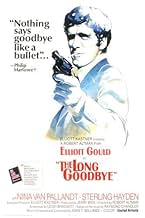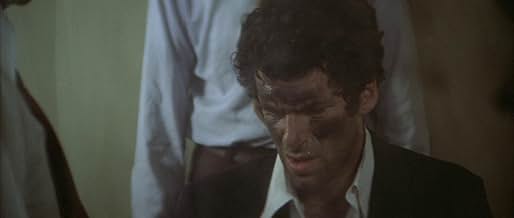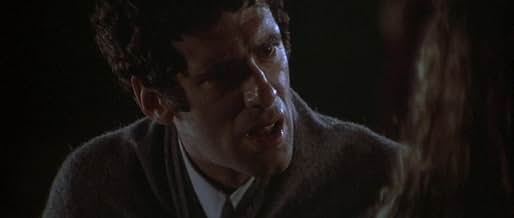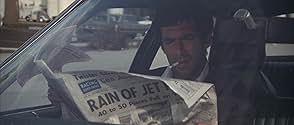El investigador privado Philip Marlowe ayuda a un amigo a salir de un apuro y acaba viéndose incriminado en el asesinato de su mujer.El investigador privado Philip Marlowe ayuda a un amigo a salir de un apuro y acaba viéndose incriminado en el asesinato de su mujer.El investigador privado Philip Marlowe ayuda a un amigo a salir de un apuro y acaba viéndose incriminado en el asesinato de su mujer.
- Dirección
- Guión
- Reparto principal
- Premios
- 2 premios y 1 nominación en total
Stephen Coit
- Detective Farmer
- (as Steve Coit)
Vincent Palmieri
- Vince
- (as Vince Palmieri)
Pancho Córdova
- Doctor
- (as Pancho Cordoba)
Reseñas destacadas
Much like the 30's jazz music that opens the movie, The Long Goodbye appears on the surface to take its cue from classic film noir. No surprise here, it is based after all on the Raymond Chandler novel by the same name, Chandler as iconic a figure in the noir realm as you're likely to get and responsible for some of the most distinctly classic moments of the genre (Double Indemnity, The Big Sleep, also Strangers on a Train for Hitchcock). But instead of rehashing styles and themes from a bygone era of film-making, Altman instead takes Chandler's film noir of wandering, and hangs on it his own unique take.
Elliot Gould is Phillip Marlowe. Scruffy, sardonic and alienated private dick with a smart mouth and a cigarette eternally glued to his lips. Altman's twist? He's cool but not the suave kind that would impress dames in the 40's, the Bogart kind. He seems constantly out of place, a bit phased, doomed to observe and comment in his witty repartee on what's going on around him or just let the chips fall where they may. And they do.
Chandler's story is one of his very best. All the staples of noir are present, simultaneously fulfilling the promise of a Phillip Marlowe film and in the same time preparing the ground for Altman's take on it; murder, missing money, unhappy marriages, a private eye hired to investigate. The works. Sprawling and convoluted like the best of noirs usually are. The dialogue crackling with inventiveness, shedding tough guy lingo for a sense of playfulness, rolling in and out of the picture in a stream-of-consciousness way.
Some of the twists and characters seem to carry a sense of seething malice, a fleeting glimpse on the seamy underbelly of the Great American Beast, the scars and ugliness of Hollywood showing behind a faded facade of glamour, an escalating creepiness factor that recalls the later works of David Lynch, predating him by a good number of years as it does. The mousey Dr. Verringe and the whole clinic subplot reminded me of Lost Highway for example.
What really elevates The Long Goodbye in another level is Altman's direction and he has Vilmos Zsigmond with him. This is only my second Altman picture (after McCabe and Mrs. Miller) but 2 hours in his presence were enough to leave an indelible sense that I'm watching the work of a master on top of his craft. Altman's camera is always on the move, slowly panning and floating in and out of the frame, picking up details, guiding the eye but never getting in the middle of the story or screaming for attention. The whole thing has a natural, subdued feel to it, what with the unobtrusive lighting and bleached-out, hazy look; no glitz or glamour here. Only the faded, long-gone impression of it. This is a world we are enmeshed in that surrounds from all sides with hazy reflection.
The Long Goodbye is both a fantastic and somewhat hidden gem of 70's crime cinema and also one of the missing links in the evolution of noir, all the way from Sunset Blvd. to Mullholland Drive. You must visit at some point.
Elliot Gould is Phillip Marlowe. Scruffy, sardonic and alienated private dick with a smart mouth and a cigarette eternally glued to his lips. Altman's twist? He's cool but not the suave kind that would impress dames in the 40's, the Bogart kind. He seems constantly out of place, a bit phased, doomed to observe and comment in his witty repartee on what's going on around him or just let the chips fall where they may. And they do.
Chandler's story is one of his very best. All the staples of noir are present, simultaneously fulfilling the promise of a Phillip Marlowe film and in the same time preparing the ground for Altman's take on it; murder, missing money, unhappy marriages, a private eye hired to investigate. The works. Sprawling and convoluted like the best of noirs usually are. The dialogue crackling with inventiveness, shedding tough guy lingo for a sense of playfulness, rolling in and out of the picture in a stream-of-consciousness way.
Some of the twists and characters seem to carry a sense of seething malice, a fleeting glimpse on the seamy underbelly of the Great American Beast, the scars and ugliness of Hollywood showing behind a faded facade of glamour, an escalating creepiness factor that recalls the later works of David Lynch, predating him by a good number of years as it does. The mousey Dr. Verringe and the whole clinic subplot reminded me of Lost Highway for example.
What really elevates The Long Goodbye in another level is Altman's direction and he has Vilmos Zsigmond with him. This is only my second Altman picture (after McCabe and Mrs. Miller) but 2 hours in his presence were enough to leave an indelible sense that I'm watching the work of a master on top of his craft. Altman's camera is always on the move, slowly panning and floating in and out of the frame, picking up details, guiding the eye but never getting in the middle of the story or screaming for attention. The whole thing has a natural, subdued feel to it, what with the unobtrusive lighting and bleached-out, hazy look; no glitz or glamour here. Only the faded, long-gone impression of it. This is a world we are enmeshed in that surrounds from all sides with hazy reflection.
The Long Goodbye is both a fantastic and somewhat hidden gem of 70's crime cinema and also one of the missing links in the evolution of noir, all the way from Sunset Blvd. to Mullholland Drive. You must visit at some point.
10faraaj-1
It's true. You can't have mixed feelings about The Long Good-bye; you'll either love it or hate it. I started the movie with what I pretended was an open mind, but a secret hope that I'd be fully justified in hating it. In my defense, The Maltese Falcon is my favorite movie and Bogie is my favorite actor. Noir is my favorite film genre and I love Howard Hawk's The Big Sleep wihich had Bogart as the definitive Marlowe.
Altman's take on Chandler's other book with private eye Marlowe, The Long Good-bye, updates the action to the 1970's. He introduces a very 70's theme song and finds as different an actor as he can from Bogart for the role of Marlowe. From the opening frame, Elliot Gould plays Marlowe like a push-over. He's a man who constantly mutters to himself, suffers nervous tics, can't even fool his cat, is afraid of dog's and seems to be the only man not attracted to his sexy hippie neighbors despite their friendliness towards him and obvious promiscuousness.
However, Gould really creates a unique persona with the way he walks, talks, wise-cracks and operates. He becomes a believable person - which is why the uncharacteristic ending is so impacting. The photography, especially the night scenes, are beautifully filmed. The theme music plays everywhere - a Mexican funeral, a doorbell, a car radio etc and with different singers. There are other layers of flesh added to the telling that really work - like the compound security guards impressions of James Stewart, Barbara Stanwyck, Cary Grant and best of all Walter Brennan aka Stumpy from Rio Bravo.
This movie worked great for me and the plot, intricate though it was, was understandable. I will not compare this Marlowe to Bogart's, but do find it admirable that Altman just stuck to the goal of making a good movie without trying to ape or make obvious references to the noir genre.
Altman's take on Chandler's other book with private eye Marlowe, The Long Good-bye, updates the action to the 1970's. He introduces a very 70's theme song and finds as different an actor as he can from Bogart for the role of Marlowe. From the opening frame, Elliot Gould plays Marlowe like a push-over. He's a man who constantly mutters to himself, suffers nervous tics, can't even fool his cat, is afraid of dog's and seems to be the only man not attracted to his sexy hippie neighbors despite their friendliness towards him and obvious promiscuousness.
However, Gould really creates a unique persona with the way he walks, talks, wise-cracks and operates. He becomes a believable person - which is why the uncharacteristic ending is so impacting. The photography, especially the night scenes, are beautifully filmed. The theme music plays everywhere - a Mexican funeral, a doorbell, a car radio etc and with different singers. There are other layers of flesh added to the telling that really work - like the compound security guards impressions of James Stewart, Barbara Stanwyck, Cary Grant and best of all Walter Brennan aka Stumpy from Rio Bravo.
This movie worked great for me and the plot, intricate though it was, was understandable. I will not compare this Marlowe to Bogart's, but do find it admirable that Altman just stuck to the goal of making a good movie without trying to ape or make obvious references to the noir genre.
Private investigator Philip Marlowe is approached by a friend, Terry Lennox, who is in a bit of a jam. Marlowe helps him get to Mexico but the next day his friend's wife turns up dead. The police hold Marlowe but then release him once Terry Lennox is found dead in Mexico - suicide. To the cops it is an open-and-shut case of murder-suicide but Marlowe doesn't believe that to be the case. Marlowe then is hired by the wife of wealthy author Roger Wade to find her husband. The Wades were neighbours of the Lennoxes. A powerful mob boss also leans on him to find the large sum of money Terry Lennox was transporting for him. Could all these events be connected?
Robert Altman directs a movie based on a Raymond Chandler novel, and it's a mixed bag.
Starts off very well with some humorous scenes and dialogue and a fair amount of intrigue. The middle-to-end sections lack focus, however, and, while it is never dull, the movie feels like it is drifting to a lacklustre conclusion. The intrigue just seems to get sucked out of the movie in that segment. In addition, the theme song gets played in just about every situation and in various forms - it gets very irritating, very quickly.
Ends well though, with a good twist and a powerful conclusion.
A new take on Philip Marlowe from Elliott Gould - he is hardly Humphrey Bogart and he's not trying to be. Altman's Philip Marlowe is the dishevelled, anti-social chain-smoking anti-hero rather than the suave, confident hero that Bogart portrayed. For the most part, it works, though at times I wished for the coolness and wise-cracks of Bogie.
Supporting cast are fine. Sterling Hayden is great as the larger-than-life, Ernest Hemingway/John Huston-esque Roger Wade.
Not the Philip Marlowe of the Bogart movies, but it'll do.
Robert Altman directs a movie based on a Raymond Chandler novel, and it's a mixed bag.
Starts off very well with some humorous scenes and dialogue and a fair amount of intrigue. The middle-to-end sections lack focus, however, and, while it is never dull, the movie feels like it is drifting to a lacklustre conclusion. The intrigue just seems to get sucked out of the movie in that segment. In addition, the theme song gets played in just about every situation and in various forms - it gets very irritating, very quickly.
Ends well though, with a good twist and a powerful conclusion.
A new take on Philip Marlowe from Elliott Gould - he is hardly Humphrey Bogart and he's not trying to be. Altman's Philip Marlowe is the dishevelled, anti-social chain-smoking anti-hero rather than the suave, confident hero that Bogart portrayed. For the most part, it works, though at times I wished for the coolness and wise-cracks of Bogie.
Supporting cast are fine. Sterling Hayden is great as the larger-than-life, Ernest Hemingway/John Huston-esque Roger Wade.
Not the Philip Marlowe of the Bogart movies, but it'll do.
Phillip Marlowe is out getting food for his cat at 3am when friend Terry Lennox pops over and asks for a lift to Mexico. Marlowe obliges but returns to his home to find the police waiting for him with stories of Terry murdering his wife and Marlowe being an accessory. Three days later he is released from a holding cell whereupon he learns the news of his friend's suicide and all charges are dropped. Determined to get to the bottom of this open and shut case, Marlowe finds himself involved in the stormy marriage of Roger and Eileen Wade and the criminal activities of Marty Augustine.
Hailed as a classic, this film is actually a bit of hard work crossed with cool style in a plot that gets somewhere but seems to take a long time and a million back roads to get there. It won't be to everyone's tastes as a result because, even though I quite liked it, I must confess that the narrative is hard to follow and hard to particularly care much about. The wit of it is watching Marlowe updated a device that will annoy as many as it pleases. In Gould's laidback and shabby detective we have the opposite of the tough and snappy detectives of the genre, but it sits well within the modern setting of the modern generation (as was) with its hedonism and fads. This is interesting but not the same as a good detective story, which sadly this isn't. If you're not won over by the overall approach then it is unlikely that you will find a lot more to fill the time.
Altman's direction is focused on the style and, although he is fairly respectful to the material in regards what happens, he doesn't go out of his way to make it engaging. Gould fits the role well and enjoys his character. I would have liked more of the complexity underneath to come through to contrast with this surface. He is the film but he is well supported by a hammy show from Sterling and solid turns from Rydell, Pallandt, Gibson and Bouton.
Overall then a difficult film to really like. It has enough of its own style to be interesting but not enough of a hook in the narrative to please a mass audience. Altman's hands are all over the film and I understand why some viewers don't like it for that reason. Not one for those looking for a gripping detective story, but still interesting.
Hailed as a classic, this film is actually a bit of hard work crossed with cool style in a plot that gets somewhere but seems to take a long time and a million back roads to get there. It won't be to everyone's tastes as a result because, even though I quite liked it, I must confess that the narrative is hard to follow and hard to particularly care much about. The wit of it is watching Marlowe updated a device that will annoy as many as it pleases. In Gould's laidback and shabby detective we have the opposite of the tough and snappy detectives of the genre, but it sits well within the modern setting of the modern generation (as was) with its hedonism and fads. This is interesting but not the same as a good detective story, which sadly this isn't. If you're not won over by the overall approach then it is unlikely that you will find a lot more to fill the time.
Altman's direction is focused on the style and, although he is fairly respectful to the material in regards what happens, he doesn't go out of his way to make it engaging. Gould fits the role well and enjoys his character. I would have liked more of the complexity underneath to come through to contrast with this surface. He is the film but he is well supported by a hammy show from Sterling and solid turns from Rydell, Pallandt, Gibson and Bouton.
Overall then a difficult film to really like. It has enough of its own style to be interesting but not enough of a hook in the narrative to please a mass audience. Altman's hands are all over the film and I understand why some viewers don't like it for that reason. Not one for those looking for a gripping detective story, but still interesting.
The first time I saw this movie was back in the seventies and this was the film that won me over to Robert Altman's great works in the American cinema.
Granted, at the time of the movie's release Raymond Chandler purists naturally didn't appreciate the transformation his knight errant private eye underwent. But nowadays, the viewer must see the film for its great direction, terrific performances, Leigh Brackett's excellent screenplay and the fine cinematography. Not to mention simply the challenge of understanding a truly baffling plot. As in all of Altman's works, this one is peppered with offbeat characters and subtle (and some not-so subtle) situations that positively take you by surprise. As a maverick figure in Hollywood, Altman made sure "iconoclast" was stamped all over this film, it's a true nose-thumbing at every institution that Hollywood reveres; idealistic movie heroes, neat happy-ever-after endings, big budget spectacles, dependable money-making conventions and all around ass-kissing.
But the real treat here is, of course, Elliott Gould, and I don't believe that it's the best thing he's ever done on screen, as many think. He's certainly turned out even better performances than this one throughout the past 3 decades. But yet, in The Long Goodbye, Gould is just so much fun to watch, especially when he's being interrogated by the police or just muttering lines like, "He's got a girl, I got a cat" or "a melon convention" when he gives up trying to get his topless next-door neighbors' attention.
An interesting thing to note at the end of the film - we see the back shot of Marlowe walking away and that to me, was the private eye's closing shot, but then we have a front shot of Elliott Gould who begins playing his harmonica and then continues on up the road doing his little number, dancing a jig, etc. And to me that shows where Marlowe left off and where Gould takes over. So they weren't one and the same after all. Once again, a statement to those who would be too quick to take the Marlowe myth seriously.
The Long Goodbye is vintage Altman, a masterwork to be savoured forever.
Granted, at the time of the movie's release Raymond Chandler purists naturally didn't appreciate the transformation his knight errant private eye underwent. But nowadays, the viewer must see the film for its great direction, terrific performances, Leigh Brackett's excellent screenplay and the fine cinematography. Not to mention simply the challenge of understanding a truly baffling plot. As in all of Altman's works, this one is peppered with offbeat characters and subtle (and some not-so subtle) situations that positively take you by surprise. As a maverick figure in Hollywood, Altman made sure "iconoclast" was stamped all over this film, it's a true nose-thumbing at every institution that Hollywood reveres; idealistic movie heroes, neat happy-ever-after endings, big budget spectacles, dependable money-making conventions and all around ass-kissing.
But the real treat here is, of course, Elliott Gould, and I don't believe that it's the best thing he's ever done on screen, as many think. He's certainly turned out even better performances than this one throughout the past 3 decades. But yet, in The Long Goodbye, Gould is just so much fun to watch, especially when he's being interrogated by the police or just muttering lines like, "He's got a girl, I got a cat" or "a melon convention" when he gives up trying to get his topless next-door neighbors' attention.
An interesting thing to note at the end of the film - we see the back shot of Marlowe walking away and that to me, was the private eye's closing shot, but then we have a front shot of Elliott Gould who begins playing his harmonica and then continues on up the road doing his little number, dancing a jig, etc. And to me that shows where Marlowe left off and where Gould takes over. So they weren't one and the same after all. Once again, a statement to those who would be too quick to take the Marlowe myth seriously.
The Long Goodbye is vintage Altman, a masterwork to be savoured forever.
¿Sabías que...?
- CuriosidadesThe location for Roger Wade - Sterling Hayden's home was actually Robert Altman's home at the time.
- PifiasDuring the scene where Marlowe is chasing Mrs. Wade in her top-down Mercedes 450 SL convertible, the car goes from having head rests to having no head rests in various shots.
- Citas
Philip Marlowe: Nobody cares but me.
Terry Lennox: Well that's you, Marlowe. You'll never learn, you're a born loser.
Philip Marlowe: Yeah, I even lost my cat.
- ConexionesEdited into El adios largos (2013)
- Banda sonoraThe Long Goodbye
by John Williams and Johnny Mercer
Performed by The Dave Grusin Trio, Jack Sheldon, Clydie King, Jack Riley, Morgan Ames, Aluminum Band, The Tepoztlan Municipal Band
Selecciones populares
Inicia sesión para calificar y añadir a tu lista para recibir recomendaciones personalizadas
Detalles
- Fecha de lanzamiento
- País de origen
- Idiomas
- Títulos en diferentes países
- El llarg adéu
- Localizaciones del rodaje
- 2178 High Tower Drive, Hollywood, Los Ángeles, California, Estados Unidos(Marlowe's residence)
- Empresas productoras
- Ver más compañías en los créditos en IMDbPro
Taquilla
- Presupuesto
- 1.700.000 US$ (estimación)
- Recaudación en todo el mundo
- 27.504 US$
Contribuir a esta página
Sugerir un cambio o añadir el contenido que falta

Principal laguna de datos
By what name was Un largo adiós (1973) officially released in India in Hindi?
Responde

































